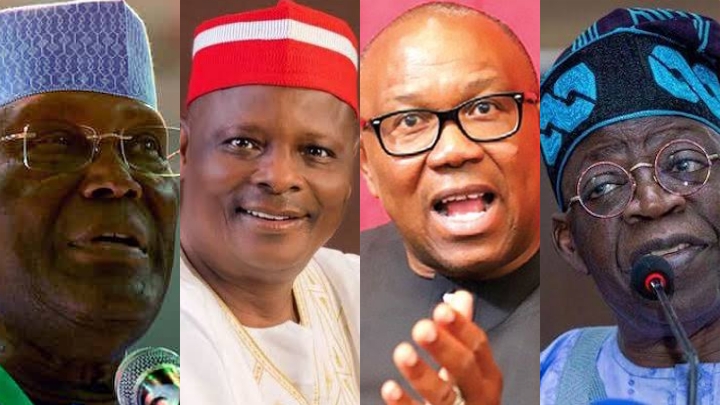PT State of the Race: Is it still a four-horse race?
There are 48 days left on Sunday until Nigeria's seventh presidential election since 1999. The February 25 poll will carry the symbols of 18 parties, up from 79 in the previous poll in 2019.
However, largely to separate the men from the boys, the media characterized this election as a four-horse race. This assessment identified the ruling All Progressives Congress (APC) candidate, Bola Tinubu; that of the former ruling People's Democratic Party (PDP), Atiku Abubakar; and two former state governors, Peter Obi of the Labor Party and Rabiu Kwankwaso of the New Nigeria People's Party (NNPP), as candidates to succeed incumbent President Muhammadu Buhari.
Based on what we've observed in the first four months of open campaigns, the rating seems appropriate.
Only the "Big Four" candidates held rallies and participated in debates, town halls, interviews, and other media engagements. It's as if the 14 "minor candidates" are asleep as they've been largely invisible in their tracks on the pitch so far.
runoffThe emergence of MM. Obi and Kwankwaso as candidates was considered to be of such importance that a joint delegation from the American National Democratic Institute and the International Republican Institute, on election observation in Nigeria in July, predicted that they would take the election in a runoff.
A run-off will be held for the two leading candidates if the one with the most votes does not also receive at least 25% of the votes cast in each of Nigeria's 24 of 36 states and the Capital Territory federal.
This, however, is uncharted territory for Nigeria. None of the nine presidential elections held in the country since 1979, when Nigeria swapped the Westminster parliamentary system inherited from its British colonizers for the American presidential system, has failed to produce a winner in the first round.
>The permutation was that MM. Obi and Kwankwaso could garner enough votes to send Mr. Tinubu or Atiku to the runoff on March 4.

However, a series of opinion polls have since projected Mr. Obi as the leading candidate, although none have gone so far as to project him as the winner in the first round.
But after four months of observing the contestants, does it still look like a four-horse race?
We can glean the answers from the position of the four candidates seven weeks before the ballot.
TinubuThe former governor of Lagos secured the nomination with a landslide victory in the APC primary held in Abuja on June 8. But his appointment of a former Borno governor, Kashim Shettima, a fellow Muslim, quickly soured the euphoria and threw his offer under an early storm that saw some of his northern Christian associates abandon him in rage.



There are 48 days left on Sunday until Nigeria's seventh presidential election since 1999. The February 25 poll will carry the symbols of 18 parties, up from 79 in the previous poll in 2019.
However, largely to separate the men from the boys, the media characterized this election as a four-horse race. This assessment identified the ruling All Progressives Congress (APC) candidate, Bola Tinubu; that of the former ruling People's Democratic Party (PDP), Atiku Abubakar; and two former state governors, Peter Obi of the Labor Party and Rabiu Kwankwaso of the New Nigeria People's Party (NNPP), as candidates to succeed incumbent President Muhammadu Buhari.
Based on what we've observed in the first four months of open campaigns, the rating seems appropriate.
Only the "Big Four" candidates held rallies and participated in debates, town halls, interviews, and other media engagements. It's as if the 14 "minor candidates" are asleep as they've been largely invisible in their tracks on the pitch so far.
runoffThe emergence of MM. Obi and Kwankwaso as candidates was considered to be of such importance that a joint delegation from the American National Democratic Institute and the International Republican Institute, on election observation in Nigeria in July, predicted that they would take the election in a runoff.
A run-off will be held for the two leading candidates if the one with the most votes does not also receive at least 25% of the votes cast in each of Nigeria's 24 of 36 states and the Capital Territory federal.
This, however, is uncharted territory for Nigeria. None of the nine presidential elections held in the country since 1979, when Nigeria swapped the Westminster parliamentary system inherited from its British colonizers for the American presidential system, has failed to produce a winner in the first round.
>The permutation was that MM. Obi and Kwankwaso could garner enough votes to send Mr. Tinubu or Atiku to the runoff on March 4.

However, a series of opinion polls have since projected Mr. Obi as the leading candidate, although none have gone so far as to project him as the winner in the first round.
But after four months of observing the contestants, does it still look like a four-horse race?
We can glean the answers from the position of the four candidates seven weeks before the ballot.
TinubuThe former governor of Lagos secured the nomination with a landslide victory in the APC primary held in Abuja on June 8. But his appointment of a former Borno governor, Kashim Shettima, a fellow Muslim, quickly soured the euphoria and threw his offer under an early storm that saw some of his northern Christian associates abandon him in rage.


What's Your Reaction?






















